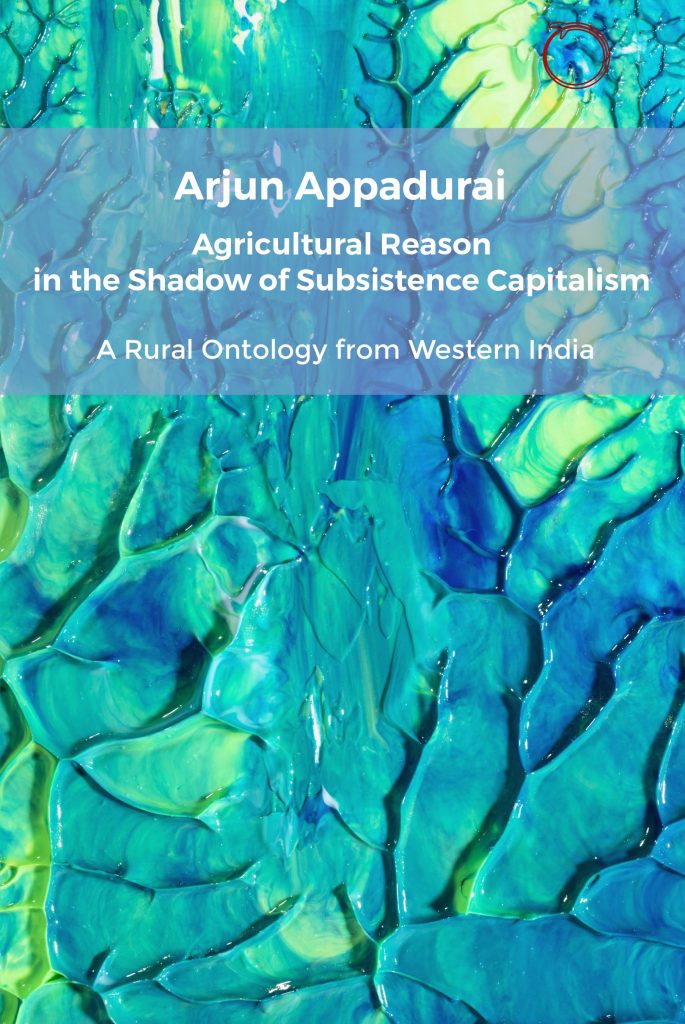A Rural Ontology from Western India
By Arjun Appadurai
This collection of essays by Arjun Appadurai based on his fieldwork in rural Maharashtra, India, in the early 1980s is one of the few anthropological treatments of agricultural reasoning. In conversation with agronomists, economists, and development anthropologists, the essays explore the ways agricultural technologies, changes in how surface wells are dug and managed, the provision and sharing of food and management of time, issues of scale in studying rural lives, and how local knowledge is formed and transformed reveal the distinctive character of rural Indian sociality. Locating these features in the context of “subsistence capitalism,” Appadurai draws our attention to the importance of relational practices and the pull of autonomy. These essays offer a close look at an agrarian society at the pivotal moment of its encounter with capitalist transformation and study ideas of measurement, sociality, and independence.
“Before his paradigm-shattering work on globalization, Arjun Appadurai wrote some scintillating essays on agriculture in India. Collected together for the first time, these essays represent a magnificent contribution to agrarian studies and rurality, and demonstrate the power of cultural analysis for understanding the everyday activities of food production and distribution.”
— Akhil Gupta, author of Postcolonial Developments: Agriculture in the Making of Modern India and Red Tape: Bureaucracy, Structural Violence, and Poverty in India.
“Appadurai makes a bold and original case for agricultural reason through a densely textured study of what he calls subsistence capitalism in the villages of western India. In these essays, he rescues peasant rationality from the condescension of those who would limit it to the mere reproduction of local cosmologies. By closely looking at the sociality that undergirds social hierarchy, he shows us how peasants generate everyday concepts and a theory of relationality as much as techniques of production. This book brings peasants back into discussions of contemporary capitalism, not as detritus but as conscious actors. A wonderful and timely publication.”
— Dilip Menon, editor of Changing Theory: Concepts from the Global South and Capitalisms: Towards a Global History
“One of anthropology’s most distinguished practitioners returns to his fieldwork in rural India to reflect more broadly on the nature of ‘subsistence capitalism,’ in whose shadow growing numbers of the world’s population must live. In such precarious conditions, he reminds us, people seek their bulwark—and their measure of value—in an everyday give-and-take, a ‘stubborn sociality,’ that is their hedge against immiseration. The penetrating insights offered here are as relevant to the poor of post-industrial cities today as they were to farmers in rural Maharashtra. A scintillating read!”
— Jean Comaroff, coauthor of Theory from the South: Or How Euro-America is Evolving Toward Africa and Millennial Capitalism and the Culture of Neoliberalism
Arjun Appadurai is professor emeritus of media, culture, and communication at New York University. His books include Fear of Small Numbers: An Essay on the Geography of Anger, The Future as Cultural Fact: Essays on the Global Condition, Banking on Words: The Failure of Language in the Age of Derivative Finance, and Modernity At Large: Cultural Dimensions of Globalization.
© HAU Books 2024
ISBN: 978-1-914363-06-1 [paperback]
ISBN: 978-1-914363-10-8 [PDF]
6″ x 9″, 158 pp.
$23
Contents
Subsistence Capitalism
Agricultural Reason
The Biography of the Project
A Coda on the Social and on Sociality
The Problem
The Ethnographic Context
The Practical Ethos of Peasant Measurement
Measurement as Approximation
Measurement as Negotiation
Conclusion
Some Terminological Clarifications
Mutual Criticisms
Deficiencies in Large-Scale Studies
Limitations of Village Studies
A Case Study of Village-Level Economic Research
Linkage Between Levels: A Methodological Proposal
From Distributions to Relations
Ecumenism and Epistemology
Introduction
Context
The Ethnographic Locus
The Place of Wells in Agrarian Culture
The Technology of Wells
The Distribution and Control of Wells
Turn-Taking and Constraints on Production
Sharing and Conflict
Wells, Commercialization, and Cooperation
Some Dilemmas of Description
The Village of Vadi
Agricultural Livelihood
Women and the Provision of Food
The Structure of the Diet
Scale, Intricacy, and Frequency in Women’s Transactions
The Sociality of Subsistence
Conclusion: Exigency and Improvisation in Dietary Strategy
Introduction: Morality, Politics, and Technological Change
Agriculture in Maharashtra
Commercialization and Agricultural Discourse
The Ethnographic Locus
The Technology and Sociology of Irrigation in Vadi
Knowledge Shifts in the Locality
Knowledge Loss
Shifts in Ways of Knowing
Conclusion
The open-access PDF of this book, attached above, is made available by Hau Books through a Creative Commons license BY-NC-ND 4.0 International (Attribution Required / Non-Commercial Use / No Derivatives). Additional rights clearance may be necessary for third-party content within.
